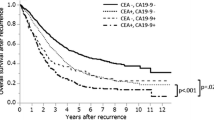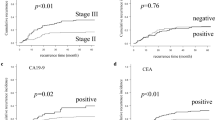PURPOSE: CA19-9 is often used in combination with carcinoembryonic antigen to manage patients with colorectal cancer, even though there is insufficient evidence to support this use of CA19-9. Carcinoembryonic antigen, by contrast, has been regarded as a better indicator of poor prognosis and recurrence. The purpose of this study is to clarify whether CA19-9 is, in fact, a useful marker in the management of colorectal cancer patients by comparing it with carcinoembryonic antigen. METHODS: A retrospective investigation was done for a consecutive series of 155 patients with colorectal adenocarcinoma who underwent potentially curative surgery between 1995 and 1999. Excluded were patients with postoperative assays performed less than three times for either carcinoembryonic antigen or CA19-9 and those who had developed secondary cancers. Data from 118 patients were analyzed in terms of prediction of prognosis and detection of recurrences. RESULTS: The sensitivities of preoperative CA19-9 and carcinoembryonic antigen were 29.8 percent and 45.3 percent, respectively. In the univariate analysis of preoperative carcinoembryonic antigen and CA19-9 assays in 114 patients, high carcinoembryonic antigen level was significantly associated with poor prognosis (P = 0.0090 by log-rank test). We could not find a significant association between preoperative CA19-9 abnormality and survival (P = 0.12). Multivariate analysis of preoperative factors indicated significance in TNM stage (P = 0.0094) and tumor location (P = 0.036) but in neither carcinoembryonic antigen (P = 0.061) nor CA19-9 (P = 0.22). Among 40 patients with recurrences, postoperative elevations of tumor markers were seen in 19 cases for CA19-9 and in 37 for carcinoembryonic antigen throughout the follow-up periods. Sensitivity, specificity, positive predictive value, and negative predictive value were 0.48, 0.88, 0.68, and 0.77, respectively, for CA19-9, and 0.93, 0.88, 0.80, and 0.96, respectively, for carcinoembryonic antigen. In patients with recurrences, the initial postoperative elevation of tumor markers was seen earlier than the detection of recurrence in 68.4 percent of those with CA19-9 elevation and in 67.6 percent of those with carcinoembryonic antigen elevation. There was only one patient with recurrence who had CA19-9 elevation without carcinoembryonic antigen elevation, while 19 recurrent patients had carcinoembryonic antigen elevation without CA19-9 elevation. Multivariate analysis showed a significant risk of carcinoembryonic antigen elevation against recurrence with an odds ratio of 32.0 (P < 0.0001), in contrast to an insignificant association of CA19-9 elevation (P = 0.23). CONCLUSION: We could not find clinical significance to support the use of CA19-9 to predict the prognosis and detect recurrence of colorectal cancer. Because of this, we do not recommend routine use of CA19-9 in staging and surveillance of colorectal cancer patients.
Similar content being viewed by others
Author information
Authors and Affiliations
Corresponding author
About this article
Cite this article
Morita, S., Nomura, T., Fukushima, Y. et al. Does Serum CA19-9 Play a Practical Role in the Management of Patients With Colorectal Cancer?. Dis Colon Rect 47, 227–232 (2004). https://doi.org/10.1007/s10350-003-0041-6
Issue Date:
DOI: https://doi.org/10.1007/s10350-003-0041-6




